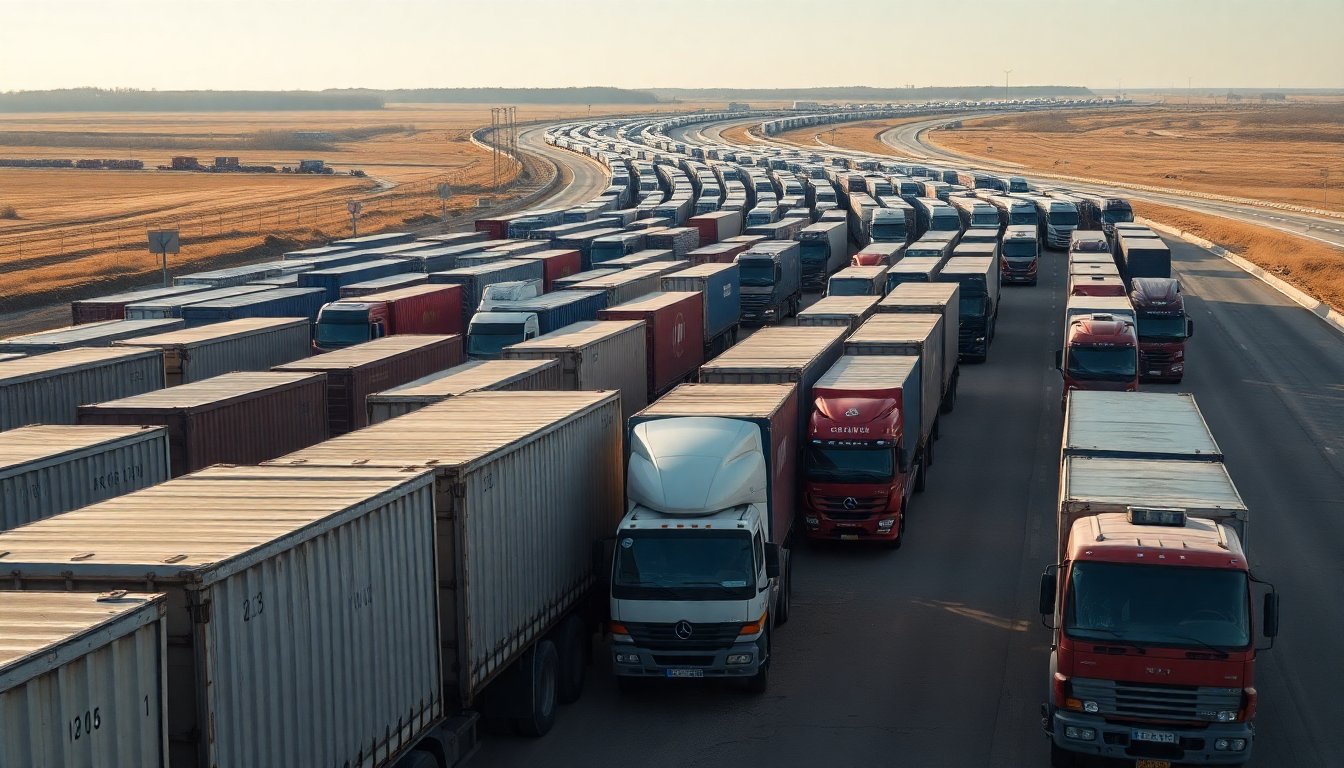Table of Contents
For nearly two months, the border between Russia and Kazakhstan has become a chaotic parking lot, with thousands of trucks stranded. This congestion began in early September when Russia suspended freight crossings, citing issues with falsified customs declarations. As a result, thousands of trucks carrying goods worth millions of rubles remain trapped and unable to proceed.
Reports indicate that approximately 10,000 trucks are backed up at the border, many of which have been stalled for weeks. Kazakhstan has emerged as a vital transit route for goods heading to Russia from various countries, including China, Turkey, and Kyrgyzstan. Analysts suggest that a significant portion of the stranded trucks transport electronics, drones, and other Western products now subject to import restrictions due to international sanctions.
The causes behind the traffic jam
Russia’s Federal Customs Service has attributed the situation to “dishonest participants in foreign trade,” blaming importers for instructing drivers to wait at the border until customs inspections ease. However, many truckers argue that the situation affects all drivers, regardless of their cargo. Irina, the wife of a long-haul driver, described the dire conditions that drivers face while waiting: “It’s a nightmare. They’re parked wherever possible, and it’s complete chaos—accidents, arguments, and fights are common. There’s no access to proper sanitation or food.”
Personal stories amidst chaos
Irina shared her husband’s struggles during this ordeal. After weeks of waiting, he ran out of money, prompting Irina to send him financial support. Eventually, he abandoned his truck after his employer agreed to send another driver to retrieve it. As Irina explained, “My husband is now without a paycheck, and our family’s finances are strained.” The employer, who deals with legitimate cargo, also faces bankruptcy risks, contradicting media claims that trucks with ordinary goods pass through within days.
Discrepancies in customs operations
At the Mashtakovo checkpoint, Igor, another driver, challenged the official narrative that the lines were clearing. “Two weeks ago, we had 5,000 trucks, and now it’s 7,000,” he stated. He noted rumors suggesting that only trucks owned by certain companies, such as those linked to Kazakh businessman Gadzhi Gadzhiev, are being allowed through. Igor claimed these trucks reportedly pay up to $700 for expedited customs processing without thorough inspections.
Exposing inefficiencies
An economics professor from a Siberian university expressed skepticism regarding the government’s explanation about enforcing Eurasian Economic Union regulations, pointing out that other member states like Kyrgyzstan and Belarus do not experience similar delays. He speculated that the bottleneck might stem from a large volume of gray-market goods, including drones and electronics previously used in sabotage activities within Russia. He concluded that customs officials appear to benefit from the ongoing chaos rather than effectively combating illegal imports, estimating substantial financial gains from each truck caught in the backlog.
Drivers confirmed that while inspections are not stricter, they are significantly slower. “Previously, it took about 15 minutes for a truck to clear,” Igor remarked, “but now we just sit and wait.”
The rise of a black market
Amidst the confusion, a black market has emerged where “helpers” charge between $300 and $1,000 per truck to expedite customs clearance. One driver, who had been waiting for 47 days with a shipment of electronics, revealed that customers are beginning to take legal action due to the delays. “Many of my colleagues are resorting to paying the ‘helpers’ as they see no other option,” he admitted.
Gulnara Bazhkenova, editor-in-chief of Orda.kz, indicated that the turmoil at Kazakhstan’s borders with both Russia and China intensified following the Shanghai Cooperation Organization summit. Reports suggest that Chinese businessmen voiced concerns over excessive bribery to Kazakhstan’s president. While some view this as an ant-corruption effort, Bazhkenova believes it might be a mere redistribution of power among influential figures.
The role of influential businessmen
Gadzhiev has faced scrutiny in various investigative reports concerning cross-border trade with China. However, Bazhkenova perceives him as a mere executor, stating that the true decision-maker appears to be the first deputy chairman of the Kazakh National Security Committee, Ali Altynbayev. She confirmed that certain trucks still manage to cross the borders, suggesting that old schemes remain intact, albeit operating in a more manual manner. “If contacts are established through Gadzhiev, your truck will eventually move,” she explained.


